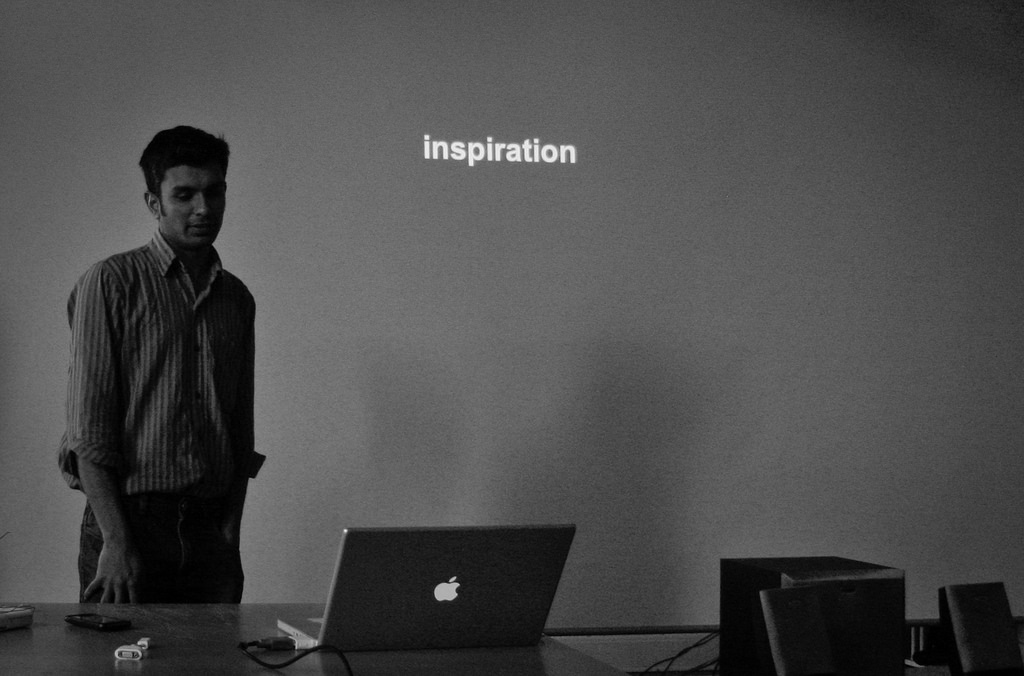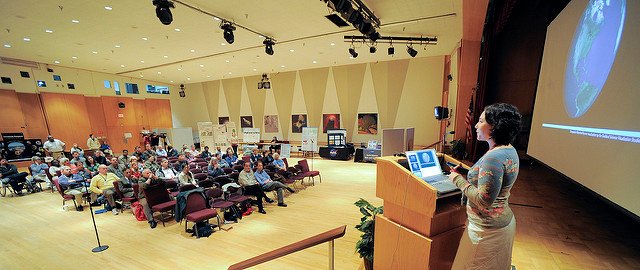
No matter how much we tell ourselves not to overstate the mishaps that might beset us during a presentation, there is a lot of truth behind the persisting notion that stepping in front of an audience is akin to some sort of trial (or execution, depending on your disposition). There is plenty of literature on preparatory methods, breathing techniques, visualization strategies, and technical tips, many of which can be useful. But they can also add to the sense that giving a successful presentation is either the result of an innate gift which we might not consider ourselves privy to, or a science that requires excessive study before any sort of mastery (or even competency) can be achieved. To dispel this notion, this piece focuses on the most essential characteristics of a well-delivered presentation, and shows that most of them are relatable to skills that we already possess.* Focus is directed towards the organizational phase, the rehearsal, and the form/execution of your presentation.
*plus a few tips from personal observations of mine, friends, and colleagues
Composing and Revising
Any work that's aim is accessibility needs to begin with a structure. The term brainstorming tends to invoke some sort of chaotic sprawl of idea-laden buzzwords laid out on paper that, on second glance, coalesce before us into a coherent thesis. This seems to work for some, but in my experience it generally leads to an even more daunting labyrinth of still-unrelated ideas. Venn diagrams and +/- charts often oversimplify material (and they're boring!) so if you do consider yourself a diagrammatic thinker, try researching the vast quantity of forms that are regularly used in your, and other, industries. If you are especially inclined, you may find that you can design your own. These are the sorts of graphics that, when refined, can be especially useful to include as multimedia support to your speech.
There is also a good chance that your topic is already chosen for you, and all that is needed is that you research and present the data that it indicates. In this case, you need only be sure to very clearly define your thesis out of the material that strikes you as most relevant. After your material is gathered, choose your media with the same criterion: nothing should be more than a few steps away from your premise or conclusion. I used to find it more difficult to edit and delete text (even whole slides/paragraphs/pages), but its actually become one of my favorite parts of preparing any form of text.
Question and answer sections are, for me, some of the most impressionable times of a presentation. Poise is more essential here than anywhere else; the interaction is both personal (with you and your questioner) and public. The balance here is between confidence in your own familiarity with the material, and acknowledgement of others' different opinions. Know that some questioners ask out of curiosity, and others for less noble reasons, but addressing both with civility will be noticed and appreciated by the rest of the audience(/jury).
Technique, Delivery, and Tone

Most of us have been coached at some point on what to avoid in a PowerPoint, but it bears reminding that gimmicky slide animations and excessive text boxes will affect your audience's receptivity. Keep your fonts, templates, and colors consistent and unobtrusive. Use the layering tool to integrate your images and text with the whole slide. When appropriate, different forms of media (audio/video clips, GIFs, quotations) are useful, but make sure to double check them before going on stage. Even just knowing how many clicks are in each slide, and how they correlate to your spoken material, makes a surprisingly noticeable difference.
Executing the speech itself is certainly more daunting than making and displaying a slideshow. I personally am prone to going over the allotted/suggested time limit (hence the above emphasis on including only necessary material), so I always try to remind myself that if you're not enjoying the words you find coming out of your mouth, your audience likely feels the same. Schedules are either actually or fancifully tight, so going over your time limit is one of the worst things you can do--you simultaneously lose your audience's attention and impose on their own programmes. Re: attention spans, be sure save several minutes at the end to revisit the structure of your presentation to refresh your audience with some already familiar material. Your prognosis can either directly precede or follow the revision, and is absolutely necessary to present yourself as a 'forward-thinking type'.
You, the speaker:
I don't particularly like the tone of a lot of TED Talk speakers, but their pacing is certainly worth emulating. TED talkers are presenting their specific research to a very wide audience*, so they generally are very adept at using pauses after sentences or clauses to allow industry outsiders to process the material. Thankfully, you are likely to be speaking to peers so your digestive pauses won't need to be as dramatic, but it is certainly useful to tend towards slower, more methodical speech, allowing you and your audience some time to recollect.
- An unfortunate side-effect of this relation of experts speaking to non-initiates is that many alter their tone of voice and end up sounding like cheap therapists. If you are speaking amongst peers, remember that this will be even more noticeable and less appropriate.
Rehearsal
At some point during the preparation, try working a condensed version of it into a conversation with a friend or family member. Try to make it a normal conversation rather than "Let me tell you about ______"*. Assuming you work in different fields, the pressure will shift from the quality of the information to: 1) the broader applications of the content, 2) the narrative structure that guides the information, and 3) your own understanding of the information.
Their questions and responses will be useful even if they aren't good. If they are relevant, they can help you prepare for a Q&A section, or even give you something to add to the presentation. Consumer-minded businesses should especially be open to hearing about the public's perspectives. If the responses aren't so pertinent, think about how their irrelevance relates to what you told them. Where did your and their lines of thought diverge, and how can you avoid that next time?
The failures easily lead into a structural analysis Whether it was a jump in information or just their being overwhelmed by the amount of content, this is how you can identify where your narrative may be misshapen. Also test your informal elements (anecdotes, jokes, cultural references) to see if they go over as well as you had imagined, and try to remember any spontaneous ones that come about.
Condensing and simplifying material tests your own comprehension as well. If you can't define a term with simpler language or a clear example, it often means you haven't quite internalised it yourself. The same goes for your argument as a whole. Take note of what sections you find more difficult to explain and consider how you might be able to reconceptualize them.
*a note about this: don't get frustrated if your unknowing test subject loses interest, and don't take it as necessarily indicating a flaw in your presentation! This is very much about practicing talking about something that is probably somewhat stuffier than your general conversation.
Preparation at Large
All this being said, I'm of the opinion that knowledge of your material is more important than any specific set of gimmicks, hence the above focus on the content of a presentation over its delivery. There are some leads mentioned above you can follow if you're not quite ready to put your material together, but I think research (especially when guided) is the most necessary element both in the value of your presentation as well as its receptive potential with the audience. Start with the research, and decide as you go how much you think stylistic techniques will be necessary. Like maybe now.
If you're looking for Presentation Training there are actually professional out-there to help you even more so.
Congratulations @assembleitmedia! You have completed some achievement on Steemit and have been rewarded with new badge(s) :
Click on any badge to view your own Board of Honor on SteemitBoard.
For more information about SteemitBoard, click here
If you no longer want to receive notifications, reply to this comment with the word
STOPDownvoting a post can decrease pending rewards and make it less visible. Common reasons:
Submit